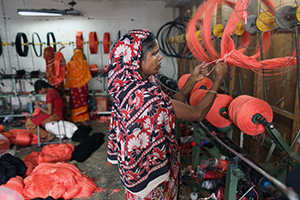
The United Nations Sustainable Development Goals (SDGs) highlight the need to achieve gender equality and to empower women and girls. Development that is truly inclusive clearly requires special attention to outcomes affecting more than half of the world’s population—yet historically, a group that has seen discrimination in law and fact over a long period.
One aspect of the gender implications of development that is relatively poorly understood relates to trade. Women all around the world are involved in the global economy: as consumers, as workers, and as business owners. However, there is a paucity of rigorous research looking at the ways in which trade integration can affect women in different ways from men, driven in part by deficiencies in gender-disaggregated statistics in many countries.
Basic trade theory allows us to set up a framework for understanding the various ways in which women interact with the global trading economy. As workers, for example, they are affected by trade opening: if a country has comparative advantage in a sector that uses female labor relatively intensively, resources will tend to flow into that sector and expand employment and earning opportunities for women. Similarly, trade liberalization affects relative prices and consumption possibilities: if goods that figure relatively largely in women’s consumption baskets fall in price, they benefit as consumers.
Although the principles are simple, their application is not. There is as yet no research that uses household survey data mapped to changes in trade policy so as to assess the changes in prices and incomes for women; however, the methods are well developed, for example in the trade and poverty literature where the same approach is used to identify the impact on poor and nonpoor households of opening to trade.
Notwithstanding this gap in the literature, anecdotal evidence provides some indications of likely mechanisms that might be important. On the consumption side, women tend to spend relatively more of their incomes on agricultural products—a sector that remains heavily distorted in world trade, with consequent implications for relative prices and women’s purchasing power. On the production side, numerous developing countries have comparative advantage in light manufacturing sectors like clothing. The apparel sector uses female labor intensively in production tasks, although many supervisory functions are performed by men, often due to entrenched discrimination. These two facts suggest that there are important mechanisms through which trade could benefit women—by increasing their purchasing power relative to men and by supporting employment and income gains. However, one area where the literature is better developed—the gender wage gap—suggests that caution is necessary, as legal or factual discrimination can often blunt the potentially positive impacts of increased demand for women’s labor.
Analysis of microdata, such as the World Bank Enterprise Surveys, supports some of these arguments. It also makes clear that women-run businesses are active in international markets but that they face particular barriers in developing overseas engagements. In part, these issues are probably scale effects, reflecting the difficulties women have in accessing finance, for example. Others are sector-specific. But increased attention to the barriers women-owned businesses face in exporting and importing could help women engage more closely with world markets.
There is a clear need to greatly increase research efforts on gender and trade. Although there is policy interest in the linkages, it often focuses on particular issues, such as the role of women cross-border informal traders in Africa, and does not deal with the mechanisms affecting large numbers of women all across the developing world. There is a dearth of empirical research on these important issues, which makes evidence-based policy making all but impossible. Researchers can contribute to more inclusive development outcomes by leveraging microdata, household surveys, and gender-disaggregated employment data to better understand the opportunities and potential costs that engagement with the trading economy holds for developing country women.







Comments are closed.